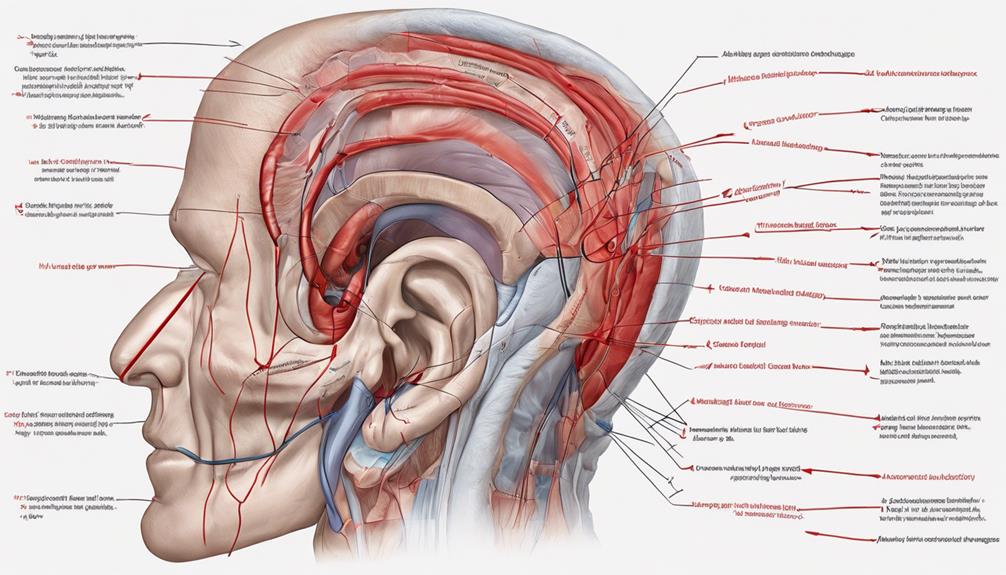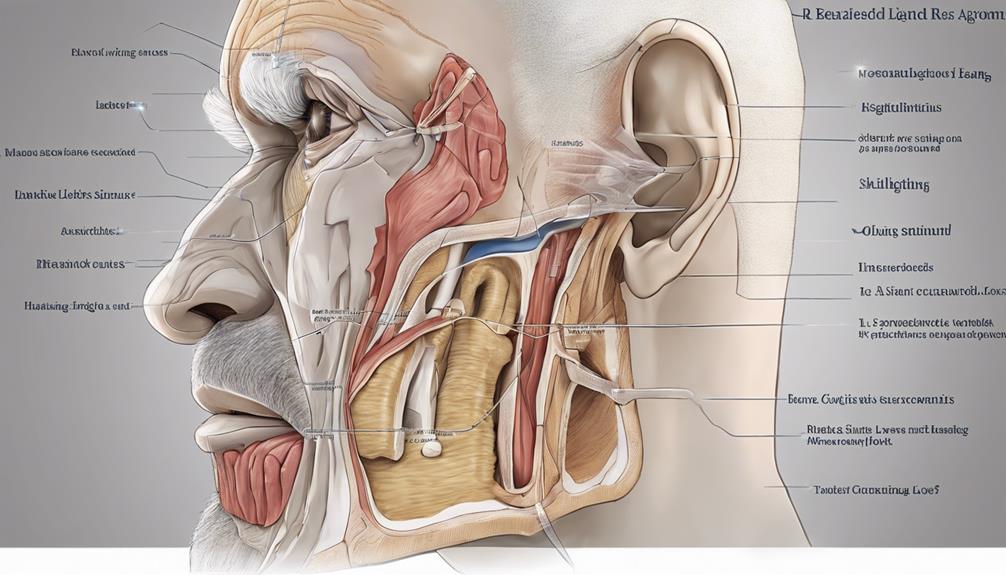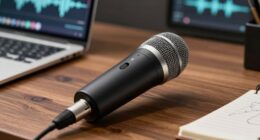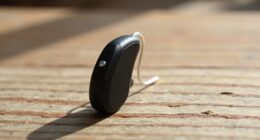You may have believed that drinking a few beverages wouldn’t impact your hearing, right? Well, think again. The link between alcohol consumption and hearing loss is not just a rumor.
As we explore the intricate details of how alcohol can lead to hearing impairments, we uncover surprising insights into the mechanisms at play. Understanding these factors is crucial in safeguarding our auditory health.
Let's unravel the mystery behind this unexpected relationship and discover what steps we can take to protect our ears from the potential harms of alcohol.
Key Takeaways
- Alcohol damages auditory cortex and inner ear fluids, leading to hearing impairment.
- Heavy drinking, especially of liquor, increases the risk of alcohol-induced hearing loss.
- Educating about alcohol's impact on hearing can help prevent long-term damage.
- Seeking professional help is crucial for assessing and addressing alcohol-related hearing issues.
The Link Between Alcohol and Hearing Loss
In our research, we've established a clear and direct correlation between alcohol consumption and the increased risk of hearing loss. Alcohol serves as a significant risk factor for hearing impairment, with numerous studies supporting this association.
Individuals who engage in heavy drinking patterns, particularly binge drinking, are more prone to experiencing hearing difficulties compared to non-drinkers or moderate drinkers. The auditory system is particularly vulnerable to the harmful effects of alcohol, as it can lead to damage in the auditory cortex of the brain responsible for processing sound signals.
Moreover, alcohol-induced changes in inner ear fluids and blood vessel swelling can contribute to a range of auditory issues, ultimately affecting hearing capabilities. It's important to recognize the detrimental impact of alcohol consumption on hearing health, as regular and excessive alcohol intake can have cumulative effects, potentially resulting in irreversible damage to the auditory system.
Mechanisms of Alcohol-Induced Hearing Damage

Alcohol-induced hearing damage is intricately linked to alterations in the inner ear's fluid composition and blood vessel swelling, contributing to a range of auditory issues. The auditory cortex, responsible for sound processing and understanding, can be damaged by alcohol consumption. This can result in difficulties in comprehending rapid speech and distinguishing voices in noisy environments.
Heavy drinking may lead to cocktail deafness, manifesting as temporary hearing loss, particularly affecting low-frequency sounds. Alcohol-induced changes in inner ear fluid composition and blood vessel swelling can impact blood flow to the auditory system, exacerbating hearing problems.
Tinnitus, characterized by ringing in the ears, is a common issue associated with alcohol-induced hearing damage. The effects of alcohol extend beyond mere hearing loss, encompassing additional symptoms like dizziness. Understanding these mechanisms is crucial in comprehending the broader impact of alcohol consumption on auditory health.
Risk Factors and Vulnerable Populations
Our examination of alcohol's impact on hearing health now turns to the identification of risk factors and vulnerable populations susceptible to auditory damage associated with alcohol consumption.
High levels of alcohol consumption, particularly in the form of liquor, are linked to an increased risk of hearing loss. Heavy drinking, including binge drinking, can result in damage to the auditory cortex in the brain, impacting sound processing and contributing to hearing issues.
Populations with lower levels of vitamin B12 may be more vulnerable to the negative effects of alcohol on hearing. Individuals who are exposed to loud environments while under the influence of alcohol face a heightened risk of hearing damage and related problems.
Furthermore, regular alcohol consumption can disrupt the composition of inner ear fluid, potentially leading to symptoms such as dizziness, tinnitus, and other auditory complications. Understanding these risk factors and vulnerable populations is crucial in addressing the relationship between alcohol consumption and the risk of hearing loss.
Preventing Alcohol-Related Hearing Loss

To prevent alcohol-related hearing loss, understanding the detrimental impact of regular alcohol consumption on the delicate hair cells in the ears is crucial. Alcohol use can damage these sensitive hair cells, leading to hearing impairment over time.
The inner ear is particularly vulnerable to the effects of alcohol, as it can alter the fluid composition within the ear, contributing to dizziness and balance issues. By moderating alcohol intake and avoiding excessive drinking, individuals can reduce the risk of alcohol-related hearing damage.
Educating individuals about the risks associated with alcohol-related hearing loss is essential in promoting awareness and encouraging safe drinking practices. It's important to recognize the potential consequences of excessive alcohol consumption on hearing health and take proactive measures to preserve auditory function.
Prioritizing responsible alcohol use can significantly mitigate the risk of developing alcohol-induced hearing impairments.
Seeking Help for Alcohol-Related Hearing Issues
Seeking assistance for alcohol-related hearing issues involves reaching out to organizations such as the National Institute on Alcohol Abuse and Alcoholism for valuable resources and support in addressing these specific concerns. Consulting healthcare professionals is vital to assess the impact of alcohol on hearing health and receive guidance on managing alcohol-related hearing problems. It is essential to address concerns about past and potential alcohol-related hearing damage by discussing symptoms and experiences with a healthcare provider. By utilizing available resources, individuals can understand the effects of alcohol on hearing and make informed decisions about drinking habits to protect hearing health. Recognizing the importance of considering hearing health when evaluating alcohol consumption habits is crucial, prompting individuals to take steps to seek help for alcohol-related hearing issues.
| Resource | Description |
|---|---|
| National Institute on Alcohol Abuse and Alcoholism | Provides resources for addressing alcohol-related hearing issues |
| Healthcare Professionals | Offer assessments and guidance on alcohol's impact on hearing health |
Frequently Asked Questions
How Does Alcohol Cause Hearing Loss?
Alcohol causes hearing loss by damaging the auditory cortex in the brain, affecting sound processing and comprehension. Excessive consumption can lead to difficulties understanding speech and distinguishing voices in noisy environments. Research confirms that heavy drinking causes brain damage impacting hearing, even with healthy ears.
This damage can result in issues like trouble understanding speech and even hearing loss. Delicate hair cell damage in the ears from alcohol can lead to temporary or permanent hearing loss.
What Are the First Signs of Liver Damage From Alcohol?
When it comes to the first signs of liver damage from alcohol, being vigilant is key. Symptoms such as fatigue, loss of appetite, and abdominal discomfort often signal potential issues.
Regular blood tests can reveal elevated liver enzymes, a sign of damage caused by alcohol consumption. It's crucial to stay proactive with medical check-ups to catch any liver damage early on and manage it effectively.
What Effect Does Alcohol Have on Auditory Processing?
Alcohol affects auditory processing by damaging the auditory cortex in the brain. This damage can lead to difficulties in understanding rapid speech, distinguishing between voices in noisy environments, and filtering background noise effectively.
The brain's ability to interpret auditory information accurately is compromised by alcohol-induced damage, resulting in challenges with speech comprehension, especially in crowded settings. Heavy drinking can impact sound processing and understanding, affecting overall auditory function.
What Part of the Brain Affects Hearing Being Affected by Alcohol?
In understanding how alcohol affects hearing, it's vital to recognize that it primarily impacts the central auditory cortex. This region of the brain, responsible for processing sound information, can be detrimentally influenced by heavy drinking.
Damage to the auditory cortex may lead to difficulties in interpreting speech quickly, distinguishing between sounds and voices, and effectively filtering out background noise. These challenges stem from alcohol's effects on the central auditory cortex, affecting sound perception.
Conclusion
In conclusion, the research on alcohol-induced hearing loss highlights a concerning statistic: individuals who consume alcohol excessively are at a higher risk of developing hearing issues.
Understanding the mechanisms behind alcohol's damaging effects on the auditory system is crucial for promoting hearing health awareness.
By addressing risk factors, implementing preventative measures, and seeking help when needed, we can work towards minimizing the impact of alcohol on hearing loss and overall well-being.
Stay informed and prioritize your hearing health.










